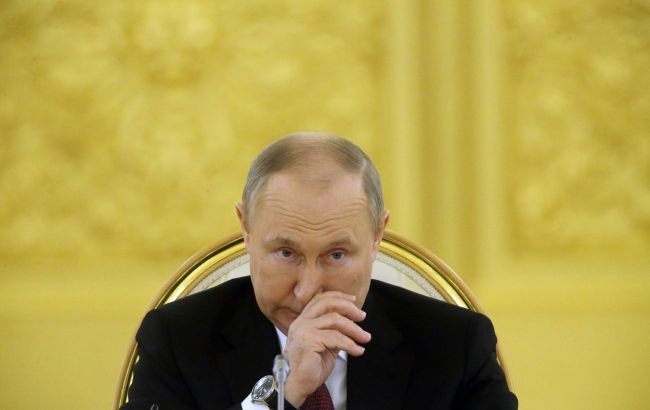Sanctions strike deep: Intelligence uncovers how the US and EU have restricted Russia
 Photo: Russian president Vladimir Putin (Getty Images)
Photo: Russian president Vladimir Putin (Getty Images)
The United States and the European Union continue to increase sanctions pressure on Russia. The Russians are facing a decline in production, rising loan costs, and tightening sanctions, according to the Foreign Intelligence Service of Ukraine.
European Union
The EU Council and the European Parliament have preliminarily agreed on the terms of the EDIP defense industry development program, which allocates €1.5 billion in funding for the next two years, including funds to involve Ukraine’s defense industry.
The European Commission is working on a proposal to attract an additional €25 billion from private Russian accounts in various countries to a reparations loan for Ukraine.
The European Bank for Reconstruction and Development plans to expand its operations in Ukraine to €2.5–3 billion per year.
The Demining Capability Coalition plans to allocate at least €165 million in 2026 to provide Ukraine with machinery and equipment.
Finland has joined the Tallinn Mechanism, which includes measures to strengthen Ukraine’s resilience to cyber threats.
European Parliament
The Committees of the European Parliament on Industry, Research and Energy, as well as on International Trade, have approved draft projects to ban the import into the EU of any Russian gas, including LNG, starting January 1, 2026.
EU defense preparedness
Next week, the European Commission will present to EU leadership a draft plan for preparing for a potential war against Russia, designed for five years.
United States
According to US Vice President JD Vance, President Donald Trump is negotiating with India and China to reduce their purchases of Russian oil and cut Russia’s energy export revenues.
The leader of the Republican majority in the US Senate, John Thune, announced readiness to support a bill introducing new trade and financial restrictions against Russia.
Germany
The Higher Regional Court in Frankfurt am Main has decided to confiscate about €720 million in favor of Germany belonging to a Russian bank that fell under European sanctions in 2022.
Estonia
The Estonian government has decided to permanently close traffic on the Värska–Saatse road, part of which passes through the Pskov region.
Finland
Russian skiers will not be able to compete in the World Cup stage in Finland — they are banned from entering the country.
Economic situation in Russia
Major Russian companies may face financial difficulties, and the state’s ability to support their projects is largely exhausted, said Minister of Economic Development Maksim Reshetnikov.
Corporate income tax revenues to regional budgets fell by 5.1% year-on-year in January–August. Russian banks cut mortgage issuance by 8% in September compared to the previous month.
Citizens’ debt for installment payments when buying housing amounts to about 1.5 trillion rubles, a 1.5-fold increase since the beginning of the year.
Russians have started saving on shopping. Spending growth rates have halved — from 13–14% in January to 6% by the end of July.
The number of new housing projects in Russia fell by 16% in January–September compared to the same period last year.
The highest risk of unsold apartments in new buildings in 2025 is recorded in Krasnodar Krai, Samara, and Krasnoyarsk. Sales of new pickup trucks in Russia decreased by 25.7% in the first nine months of 2025.
In 2025, the average cost of preparing a car for winter in Russia rose by at least 15% compared to last year.
Exchange prices for AI-95 gasoline increased by 0.19%, and for AI-92 by 0.12%.
Russia reduced exports of vegetable oils by 24% year-on-year. Imported beer prices rose by 35%, domestic by 20%.
A survey showed that the desire among Russians to start their own business fell to 14% compared to 31% in 2009.
The St. Petersburg authorities retroactively canceled a one-time gubernatorial payment of 1.6 million rubles for volunteers joining the war against Ukraine.
About 78% of companies in Krasnodar Krai reported difficulties in finding and hiring personnel. The hardest-hit sectors include healthcare, construction, sales, services, and logistics.
The volume of industrial goods inventories in Russia in monetary terms grew by 35.9% over the year.
Earlier, the Center for Countering Disinformation under the National Security and Defense Council of Ukraine reported that in several Russian regions, payments for men signing army contracts are being reduced or canceled.

